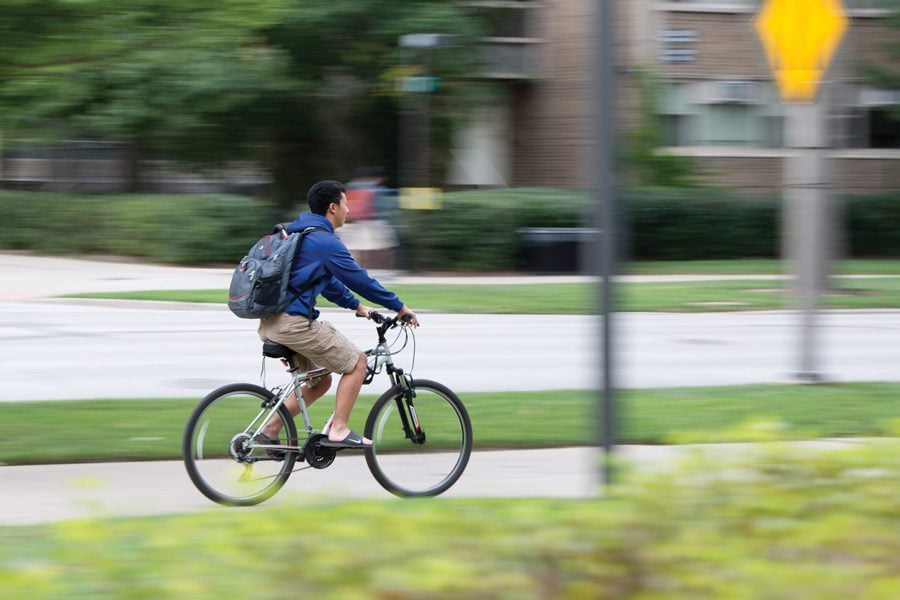City Council plans to discuss proposed speed limit change, bike lanes on Sheridan
Noah Frick Alofs/The Daily Northwestern
The speed limit on Sheridan Road is currently 30 mph. Both aldermen and Northwestern students have called for the limit to be lowered following the accident that killed Northwestern student Chuyuan Qiu on that road.
October 6, 2016
Updates to the Sheridan Road rebuilding project will be discussed at City Council on Oct. 17 in response to a call for bike safety measures following the death of Weinberg freshman Chuyuan Qiu, who was killed on the road after an accident with a cement truck in September.
Evanston already has plans in place to build bike lanes on Sheridan Road and Chicago Avenue, with work on the project slated to begin in April 2017, according to a news release. The project was delayed until 2017 by the council in 2014 because of road construction in a nearby area of the city.
Additionally, the city will consider other proposals about how to improve bike safety on the road, including requests to lower Sheridan’s speed limit. Ald. Judy Fiske (1st) and Ald. Eleanor Revelle (7th) requested the speed limit be lowered to 25 mph on Sheridan Road from the current 30 mph limit.
“Immediately lowering and enforcing the speed limit at 25 miles per hour is one positive way to improve safety on Sheridan Road, but there are others,” Fiske said in the release. “I encourage NU students to join with us for this important discussion.”
Faculty Senate passed a resolution on bike safety at NU on Wednesday that called for a lower speed limit, as well as for the annual distribution of subsidized bike lights and helmets to all students on campus.
Associated Student Government President Christina Cilento, who authored the resolution, said she plans to attend the City Council meeting to discuss the proposed changes with other students.
“I understand why construction can’t start until certain dates, but when a tragedy like this falls so far away from construction, I feel kind of helpless,” Cilento said. “I don’t know if there’s anything we can do to change the city’s plans, but I think in the interim what we can do is educate students and other cyclists about how to ride safely and make sure they have the tool to do so.”
The resolution at Faculty Senate called for the creation of a task force on bike and pedestrian safety, which will be discussed further at later Faculty Senate meetings.
Bike lanes are currently planned to go from Chicago Avenue up to Lincoln Street on Sheridan Road, through NU’s campus. Lanes will also run from Davis Street to Sheridan Road on Chicago Avenue. The portion of Sheridan Road north of Lincoln Street will be repaved in 2018.
Plans show Sheridan Road and Chicago Avenue will continue to have four-lane car traffic in addition to the new 8-foot-wide bike lanes.
City Manager Wally Bobkiewicz said although the bike lanes project may not be reworked in the meeting, it will help remind the community of the changes on the way in addition to providing a space to discuss any further action that should be taken.
“It’s a chance for the University to air its concern, other members of the community to air their concerns and come up a plan as a larger community for what our next step should be,” Bobkiewicz said.
The estimated cost of the entire 1.9-mile long project is $13.3 million.
Although most of the funding is coming from the city and the state, $500,000 of NU’s multi-year donation to the city was allotted to the improvement project. The donation is half of the first of five yearly $1 million contributions in 2015. Although the allocation for this year’s $1 million has not been announced, University officials said another portion may be directed toward the Sheridan Road project.
Outside of the construction project, Cilento said promoting better bike safety will help prevent future accidents. The biggest step NU students need to make to create a safer environment for biking, Cilento said, is changing campus culture.
“A big concern is that people on campus travel unsafely because they think wearing a helmet is uncool,” Cilento said. “We need to make a shift to understanding that it’s more important to look out for their safety first.”
Email: [email protected]
Twitter: @robinlopsahl


